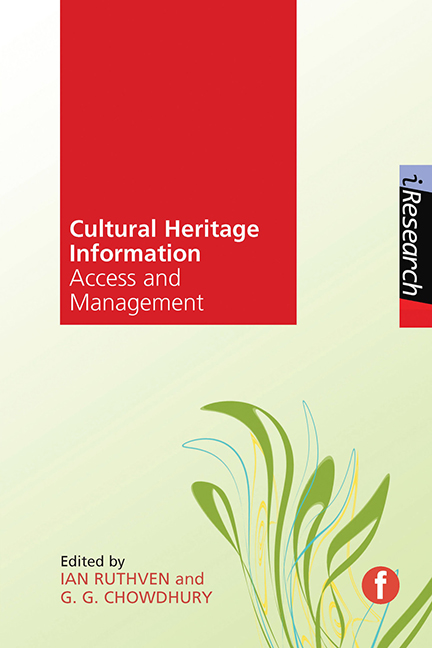Book contents
- Frontmatter
- Contents
- List of figures and tables
- Contributors
- Preface
- 1 Managing digital cultural heritage information
- 2 Digital humanities and digital cultural heritage (alt-history and future directions)
- 3 Management of cultural heritage information: policies and practices
- 4 Cultural heritage information: artefacts and digitization technologies
- 5 Metadata in cultural contexts – from manga to digital archives in a linked open data environment
- 6 Managing cultural heritage: information systems architecture
- 7 Cultural heritage information: users and usability
- 8 A framework for classifying and comparing interactions in culturalheritage information systems
- 9 Semantic access and exploration in cultural heritage digital libraries
- 10 Supporting exploration and use of digital cultural heritage materials: the PATHS perspective
- 11 Cultural heritage information services: sustainability issues
- Index
5 - Metadata in cultural contexts – from manga to digital archives in a linked open data environment
Published online by Cambridge University Press: 10 September 2022
- Frontmatter
- Contents
- List of figures and tables
- Contributors
- Preface
- 1 Managing digital cultural heritage information
- 2 Digital humanities and digital cultural heritage (alt-history and future directions)
- 3 Management of cultural heritage information: policies and practices
- 4 Cultural heritage information: artefacts and digitization technologies
- 5 Metadata in cultural contexts – from manga to digital archives in a linked open data environment
- 6 Managing cultural heritage: information systems architecture
- 7 Cultural heritage information: users and usability
- 8 A framework for classifying and comparing interactions in culturalheritage information systems
- 9 Semantic access and exploration in cultural heritage digital libraries
- 10 Supporting exploration and use of digital cultural heritage materials: the PATHS perspective
- 11 Cultural heritage information services: sustainability issues
- Index
Summary
Introduction
We have experienced drastic changes in our information and knowledge infrastructure over the past few decades. As consumers of information resources, we find and access the resources from the internet. As producers of information resources, we create information resources in digital formats and provide access to them through the internet. Libraries, museums and archives, which we refer to as memory institutions, have been keenly working to provide better accessibility to their holdings using the internet and world wide web. In this chapter, we discuss metadata issues for digital archives of cultural resources.
Metadata, meaning ‘data about data’, play an important role in finding, accessing, collecting, using, organizing, storing, delivering and preserving resources in our networked information environment. Catalogue data of holdings at libraries and museums are typical metadata. Memory institutions and their communities have been key players in building metadata standards. The fundamental changes in our information environment for the past few decades caused by the rapid growth of the internet and mobile devices have drastically increased the importance of metadata at memory institutions. Moreover, connecting cultural resources on the internet through metadata is crucial to improving the usability of the resources across communities.
Memory institutions and publishers have been keenly working to enrich their services for the networked information society. This includes activities such as converting cultural resources, which may be tangible or intangible, into digital objects, and collecting ‘born-digital’ resources such as electronic books, journals, governmental records and digital audio and visual images. Various types of metadata are created for those resources, such as bibliographic information, rights management information, technology and structural features, and preservation information. Metadata created for digital resources and used in the networked information environment have significantly different features from those for conventional non-digital resources; metadata may be embedded in the body of a digital resource, metadata may be a first-class object as well as a primary resource, and metadata may be linked to each other in order to produce a richer environment for users to access the resources over the internet.
Digital archives, which are collections of digital resources built and maintained for the long term, are an important service for memory institutions. Digital archives have to provide users with access to the archived resources and keep the resources safe over time.
- Type
- Chapter
- Information
- Cultural Heritage InformationAccess and Management, pp. 89 - 112Publisher: FacetPrint publication year: 2015
- 1
- Cited by



